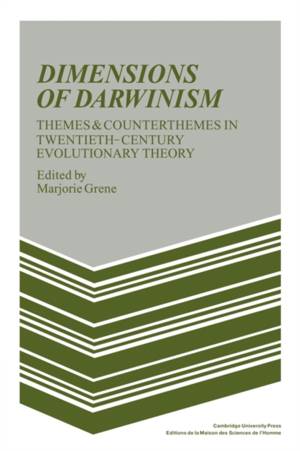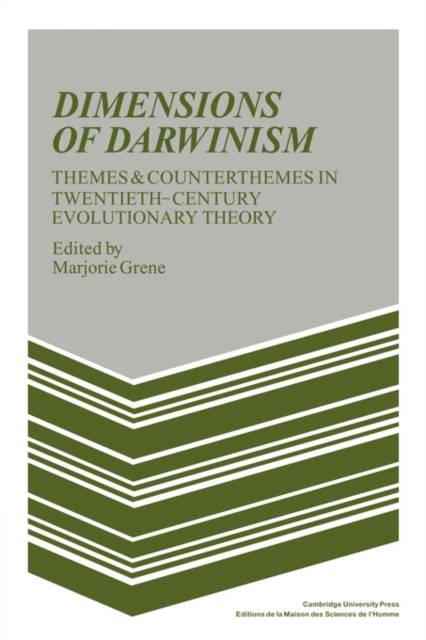
Door een staking bij bpost kan je online bestelling op dit moment iets langer onderweg zijn dan voorzien. Dringend iets nodig? Onze winkels ontvangen jou met open armen!
- Afhalen na 1 uur in een winkel met voorraad
- Gratis thuislevering in België vanaf € 30
- Ruim aanbod met 7 miljoen producten
Door een staking bij bpost kan je online bestelling op dit moment iets langer onderweg zijn dan voorzien. Dringend iets nodig? Onze winkels ontvangen jou met open armen!
- Afhalen na 1 uur in een winkel met voorraad
- Gratis thuislevering in België vanaf € 30
- Ruim aanbod met 7 miljoen producten
Zoeken
Dimensions of Darwinism
Themes and Counterthemes in Twentieth-Century Evolutionary Theory
Marjorie Grene
Paperback | Engels
€ 60,95
+ 121 punten
Omschrijving
Originally published in paperback in 1986, the essays in this book discuss questions about the growth and conceptual structure of the modern evolutionary synthesis, or 'neo-Darwinism'. Written by biologists, historians and philosophers, the collection provides a penetrating analysis of the development, meaning and problems of twentieth-century evolutionary theory. Part I includes discussion of the role of eugenics in shaping the biological interests of R. A. Fisher; the abandonment of Lamarckism; the influence of systematics and the concepts of adaptation and random drift in the development of Sewall Wright's theory; and explanation of how the synthesis 'hardened' in the decades following its original presentation. Part II examines the history of mimetic theory as a case study in evolutionary thought, while Part III introduces the reader to some aspects of the German tradition. Finally, Part IV addresses the debates that existed around the time of publication.
Specificaties
Betrokkenen
- Auteur(s):
- Uitgeverij:
Inhoud
- Aantal bladzijden:
- 348
- Taal:
- Engels
Eigenschappen
- Productcode (EAN):
- 9780521310215
- Verschijningsdatum:
- 31/03/1986
- Uitvoering:
- Paperback
- Formaat:
- Trade paperback (VS)
- Afmetingen:
- 152 mm x 229 mm
- Gewicht:
- 508 g

Alleen bij Standaard Boekhandel
+ 121 punten op je klantenkaart van Standaard Boekhandel
Beoordelingen
We publiceren alleen reviews die voldoen aan de voorwaarden voor reviews. Bekijk onze voorwaarden voor reviews.











